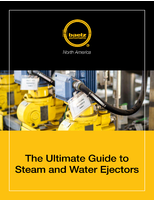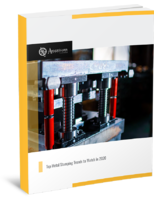Guidance On Low-GWP Refrigerants presented at ASHRAE conference.
Press Release Summary:
Challenges facing hot countries regarding finding refrigerant alternatives for HCFC-22 in residential air-conditioning will be discussed in seminar chaired by Walid Chakroun at ASHRAE 2016 Winter Conference, which will take place January 23–27, 2016 in Orlando, FL.  Technical Program will feature 8 tracks, ~100 sessions, and 300+ speakers. Topics will include test outcomes and results comparison meant to explore possible workable refrigerant alternatives for high ambient operation.
Original Press Release:
Guidance on Low GWP Refrigerants Presented at ASHRAE Winter Conference
ATLANTA – As climate change talks in Paris conclude with signing of a historic agreement, countries with high ambient temperature characteristics are looking ahead to next-generation low global warming potential (GWP) refrigerants, which take into account environmental impact, performance, safety and costs.
Such countries with high dependency on refrigeration and air-conditioning applications are mainly located in the Middle East and particularly in the Gulf region. Those countries have traditionally been recipients of globally proven refrigeration technologies.
“This trend is witnessing a change lately with movement of regional industry to enhance its research and selection capacities but it remains framed with what is commercially available worldwide in terms of the raw materials,” Walid Chakroun said.
The challenges of hot countries infinding refrigerant alternatives for the widely used HCFC-22 in residential air-conditioning will be discussed in a seminar chaired by Chakroun at the ASHRAE 2016 Winter Conference, which takes place Jan. 23-27, Orlando, Fla. The ASHRAE co-sponsored AHR Expo is being held Jan. 25-27, next door at the Orange County Convention Center. To register for the ASHRAE Conference, which includes free access to the Expo, visit www.ashrae.org/orlando.
The Technical Program features eight tracks, some 100 sessions and more than 300 speakers. It runs Sunday, Jan. 24, through Wednesday, Jan. 27, and offers over 200 Professional Development Hours, as well as Continuing Education Units, which can be applied toward a Professional Engineering license in many states, including the state of Florida.
The seminar, “Evaluating Low-GWP Refrigerants for Air-Conditioning Industry in High Ambient Temperature Countries,” is sponsored by the United Nations Environmental Programme (UNEP) and the UnitedNations Industrial Development Organization (UNIDO).
Chakroun, who serves as ASHRAE’s representative to UNEP, noted thatmost of governments in the region have started to apply new energy efficiency requirements for air-conditioning equipment. Known as Minimum Energy Performance Standards (MEPS), these standards will certainly have impact on the choice of refrigerant as well as design and operating characteristics of air-conditioning units. Meeting those conditions for high-ambient climates is another challenge for countries with air conditioning consuming 50 to 60 percent of their domestic power supply, according to Chakroun.
As a response to the above issues, UNEP and UNIDO designed and launched a regional project, known as PRAHA, for assessing the feasibility of low-GWP alternatives. The project aims to practically assess next-generation low-GWP refrigerants taking into account energy efficiency, environmental impact, performance, safety and cost.
The project involves partnerships of 13 international/regional technology providers and equipment manufacturers, seeking to independently assess and evaluate the techno-economic feasibility of low-GWP refrigerants in comparison with existing commercially available refrigerants, such as HCFCs and HFCs for different domestic and medium size commercial air-conditioning applications.
Speakers will discuss the outcome of these tests and a comparison of the results, which by no means endorse any of the tested refrigerants, but shed light on possible workable refrigerant alternatives for high ambient operation, Chakroun said. Other aspects of the project deal with economics, technology transfer and the challenges to deploy low-GWP alternatives, including recommendations of further required investigation.
Additional sessions at the ASHRAE Winter Conference that address low GWP include:
Refrigerant Advances
Evaluating Low-GWP Refrigerants for Air-Conditioning Industry in High Ambient Temperature Countries
Making the Commercialization of Low-GWP Refrigerants a Reality
Highlights from the 24th IIR International Congress of Refrigeration
Improving the Efficiency of Low-GWP Commercial Refrigeration Systems
Compression Challenges for Low-GWP Refrigerants
Trending Research and Advances in Simulation
ASHRAE, founded in 1894, is a global society advancing human well-being through sustainable technology for the built environment. The Society and its more than 54,000 members worldwide focus on building systems, energy efficiency, indoor air quality, refrigeration and sustainability. Through research, standards writing, publishing, certification and continuing education, ASHRAE shapes tomorrow’s built environment today. More information can be found at www.ashrae.org/news.




